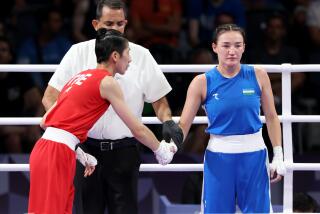Panelist: Harding’s Rights Are First : Figure skating: Member of group meeting to determine her fate for Lillehammer says vote will come today.
COLORADO SPRINGS, Colo. — A member of the U.S. Figure Skating Assn. panel that might ultimately decide Tonya Harding’s fate said Friday that individual rights should take precedence over Olympic ideals.
Speaking after five hours of deliberations at El Pomar Center, near the USFSA offices, panel member Sharon Watson said the group was doing everything possible to protect Harding’s rights. Harding has not been charged with a crime, so maintaining that philosophy could improve her chances of skating in the Olympics. A vote will be taken this morning.
“You have to look at the rights of the skaters before you look at anything as abstract as the sport’s image,” Watson told The Times.
Watson, a member of the USFSA board of directors and chairwoman of the Sanctions and Eligibility Committee, is a clinical psychologist who is executive director of the L.A. County Children’s Planning Council.
She and her colleagues--William Hybl, Col. Ken Schweitzer, Nancy Piro and Jim Cygan--are expected to offer a recommendation today on whether there are reasonable grounds for a disciplinary hearing to consider suspending Harding from the U.S. Olympic team.
The panel, which is weighing evidence of Harding’s involvement in the Jan. 6 attack on rival Olympian Nancy Kerrigan, can make a recommendation with a simple majority. Today’s decision is expected to be a turning point for Harding, who is trying to remain on the U.S. team for the Lillehammer Games.
Harding and her attorneys will be informed of the decision before it is announced. The panel will send its recommendations to USFSA President Claire Ferguson, who could call for a disciplinary hearing or pass the recommendation to USOC officials.
In Lillehammer, Richard Pound, a member of the International Olympic Committee board, said that he doesn’t think there is cause to remove Harding from the team.
“Unless you have got compelling evidence, such as a confession or a conviction, you don’t have a basis on which to overturn the results,” Pound said.
Francois Carrard, IOC director general, said that Harding’s position on the team should be decided by U.S. groups. On Thursday, an IOC official told The Times that the group does not plan to get involved in the controversy.
As the USFSA panel members sifted through affidavits, FBI reports and information provided by a Portland sheriff’s detective and attorney, they must conclude whether Harding violated the figure skating association’s code of ethics.
The decision could come down to a how the panel compares an individual’s rights to the concept of fair play.
“The nation has been focusing on the criminal aspect,” Harvey Schiller, executive director of the USOC, told reporters in Lillehammer. “(But) we are required to subscribe to the IOC Charter, which stresses that athletes act in a fair and sportsmanlike manner. If one athlete trips another going to the finish line, that is not fair play.”
Reminded that, unlike a conspiracy, everyone in the stadium would see the tripping, Schiller said: “The fact is that a prospective member of the Olympic team was injured and unable to compete, and the perpetrators have said that the purpose was to leave her out of the competition.”
The USFSA panel, which is the first step in a process that could remove Harding from the team, reviewed mounds of documents from the case, which is still being investigated by Portland authorities. They were guided by James McNelly, a Portland detective, and James Bennett, a Portland lawyer.
The group examined some information that has not been made public, Watson said. She refused to say what that new information was.
“There are a couple pieces of evidence that are reaching pivotal importance for our decision,” Watson said. “It has helped point us in a certain direction.”
Other panel members said Friday after the meeting that they were pleased with their progress.
The panel requested Harding’s presence Friday, but she and her attorneys declined.
“We have been in touch with the figure skating people and . . . decided that Tonya will not be there,” Harding’s attorney, Robert Weaver, said. “She needs to focus on training. . . . We have visited with them frequently over the telephone.”
No matter what the panel decides today, it will not be the end of Harding’s saga because possible criminal charges in Portland await.
If a disciplinary hearing is recommended by the USFSA, Harding would have 30 days to respond. If she is found to have committed an ethics violation, Ferguson, the USFSA president, could revoke Harding’s membership in the association. Harding would then be barred from skating in the World Championships in Japan on March 22-27.
But by then, the Winter Games would be only a memory.
If Harding is to be barred from the Olympics, it appears the USOC will have to intervene, presumably after a USFSA hearing recommendation. But it is unclear whether the USOC appeals process can handle the case on such short notice.
Times Senior Assistant Sports Editor Mike Kupper contributed from Lillehammer, Norway.
More to Read
Go beyond the scoreboard
Get the latest on L.A.'s teams in the daily Sports Report newsletter.
You may occasionally receive promotional content from the Los Angeles Times.






